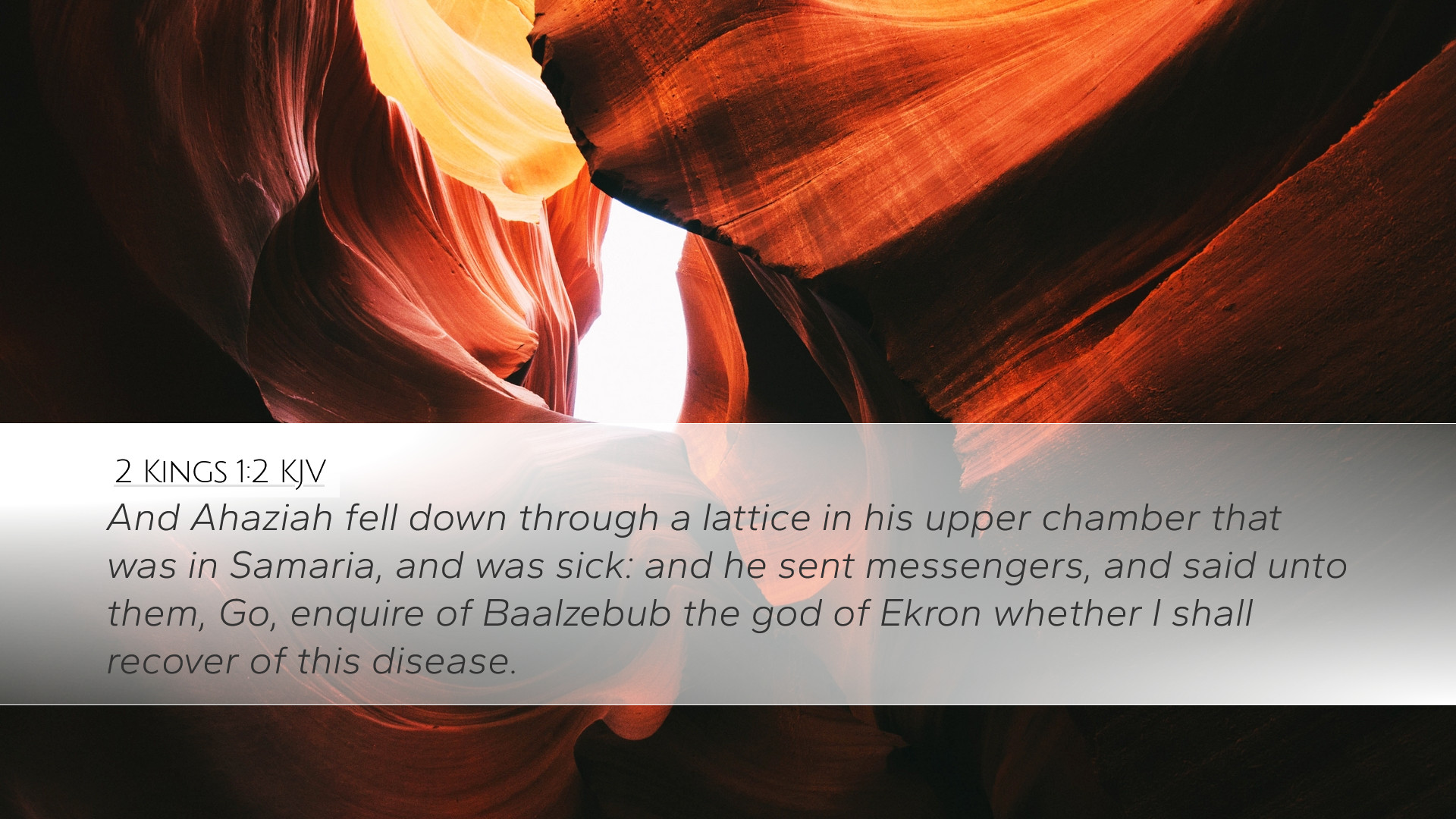Old Testament
Genesis Exodus Leviticus Numbers Deuteronomy Joshua Judges Ruth 1 Samuel 2 Samuel 1 Kings 2 Kings 1 Chronicles 2 Chronicles Ezra Nehemiah Esther Job Psalms Proverbs Ecclesiastes Song of Solomon Isaiah Jeremiah Lamentations Ezekiel Daniel Hosea Joel Amos Obadiah Jonah Micah Nahum Habakkuk Zephaniah Haggai Zechariah Malachi2 Kings 1:2
2 Kings 1:2 KJV
And Ahaziah fell down through a lattice in his upper chamber that was in Samaria, and was sick: and he sent messengers, and said unto them, Go, enquire of Baalzebub the god of Ekron whether I shall recover of this disease.
2 Kings 1:2 Bible Commentary
Commentary on 2 Kings 1:2
Verse: "And Ahaziah fell down through a lattice in his upper chamber that was in Samaria, and was sick: and he sent messengers, and said unto them, Go, inquire of Baal-zebub the god of Ekron whether I shall recover of this disease."
Context and Background
The narrative of 2 Kings 1 begins to unfold the reign of King Ahaziah of Israel, the son of Ahab and Jezebel. His character is emblematic of the spiritual degradation Israel faced during this era, with a significant focus on idolatry and apostasy. Understanding the historical backdrop of the text allows for a fuller comprehension of the implications of Ahaziah's actions.
Ahaziah's incident of falling from a lattice is not merely a physical event but a spiritual metaphor for his failure to uphold the covenant with Yahweh. This moment captures a turning point for Israel, setting the stage for Elijah's prophetic confrontation with the king and illustrating the tension between worshiping Yahweh and the allure of pagan deities like Baal-zebub.
Analysis of Key Elements
-
Ahaziah's Fall:
The phrase "fell down through a lattice" symbolizes both a literal physical fall and a metaphorical spiritual decline. Matthew Henry notes that Ahaziah’s fall is indicative of his precarious spiritual state. The lattice signifies the precariousness of life when away from God; just as one may fall through a broken structure, Ahaziah has fallen away from the foundations of faith.
-
Consultation with Baal-zebub:
This choice to inquire of Baal-zebub, the god of Ekron, highlights Ahaziah's deviation from seeking counsel from the God of Israel. Albert Barnes observes that Ahaziah's reliance on a pagan deity instead of Yahweh signifies a serious blasphemy and reflects the deep-seated idolatry in Israel at that time. The name 'Baal-zebub' can be translated as 'lord of the flies,' alluding to a dark spiritual influence that Ahaziah willingly embraces.
-
The Message of Inquisition:
The act of sending messengers to inquire about his recovery reveals Ahaziah’s desperation and spiritual blindness. Adam Clarke emphasizes the gravity of seeking guidance from a false god, which not only denies the sovereignty of God but also exhibits a lack of faith. This is a reminder for believers today to seek first the kingdom of God and His righteousness in times of trouble.
Theological Implications
Ahaziah's actions lead to significant theological implications regarding faithfulness to God. The decision to seek Baal indicates a rejection of divine authority, and instead, an acceptance of human inclination towards the visible and tangible deities of the surrounding cultures. The commentary by Matthew Henry emphasizes that in moments of affliction, the heart of man often turns to those things he trusts more, revealing where true allegiance lies.
The passage serves as a stark warning against spiritual lethargy and the temptation of syncretism in worship. Clarke points out that Israel’s reliance on foreign gods illustrates a breakdown in their relationship with the true God, which culminates in dire consequences both for the king and the nation.
Lessons for Today
For contemporary readers, the saga of Ahaziah offers key lessons about the fragility of human life and the necessity of authentic faith. Throughout history, the tendency to substitute God for worldly solutions endures. The call remains for individuals, especially leaders and those in positions of authority, to turn to God instead of human wisdom when faced with trials.
-
The Importance of Seeking God:
The most profound lesson from Ahaziah’s narrative is the imperative to seek God above all. In times of distress, it is essential to turn to prayer and Scripture rather than rely on societal norms or human intuition.
-
Covenantal Responsibility:
Ahaziah’s fall demonstrates the impact of a leader’s spiritual state on the people he governs. The actions of leaders should reflect a commitment to covenant faithfulness, which plays a crucial role in shaping the community’s faithfulness to God.
-
Discernment in Worship:
The passage challenges the reader to reflect on the sources of guidance they turn to. Are they rooted in the truth of God’s word, or are they influenced by the trends of society that may lead away from divine truth?
Conclusion
In summary, 2 Kings 1:2 serves as a sobering reminder of both humanity's frailty and the incessant allure of idolatry. The failed inquiries of King Ahaziah epitomize a profound spiritual crisis marked by a rejection of Yahweh. For pastors, students, and scholars, this verse invites deeper reflection on spiritual fidelity and the call to uphold the truth of God amidst pervasive cultural influences.
Thus, the narrative of Ahaziah prompts a clarion call for believers today: to seek the Lord in every circumstance, trusting in His omnipotence and guidance rather than the transient promises of worldly idols.


